
Sir Henry Morton Stanley was a Welsh-American explorer, journalist, soldier, colonial administrator, author and politician who was famous for his exploration of Central Africa and his search for missionary and explorer David Livingstone. Besides his discovery of Livingstone, he is mainly known for his search for the sources of the Nile and Congo rivers, the work he undertook as an agent of King Leopold II of the Belgians which enabled the occupation of the Congo Basin region, and his command of the Emin Pasha Relief Expedition. He was knighted in 1897, and served in Parliament as a Liberal Unionist member for Lambeth North from 1895 to 1900.

David Livingstone was a Scottish physician, Congregationalist, pioneer Christian missionary with the London Missionary Society, and an explorer in Africa. David was the husband of Mary Moffat Livingstone, from the prominent 18th-century missionary family, Moffat. Livingstone had a mythic status that operated on a number of interconnected levels: Protestant missionary martyr, working-class "rags-to-riches" inspirational story, scientific investigator and explorer, imperial reformer, anti-slavery crusader, and advocate of British commercial and colonial expansion. As a result, Livingstone became one of the most popular British heroes of the late 19th-century Victorian era.

Richard Marius Joseph Greene was a noted English film and television actor. A matinée idol who appeared in more than 40 films, he was perhaps best known for the lead role in the long-running British TV series The Adventures of Robin Hood, which ran for 143 episodes from 1955 to 1959.

Edward Cedric Hardwicke was an English actor, who had a distinguished career on the stage and on-screen. He was best known for playing Captain Pat Grant in Colditz (1972–73), and Dr. Watson in Granada Television's Sherlock Holmes (1986–94).
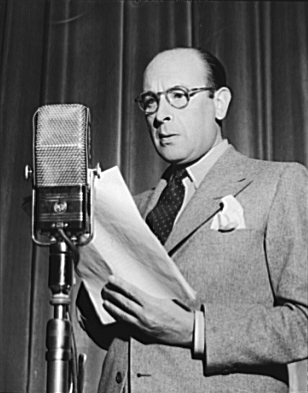
Sir Cedric Webster Hardwicke was an English stage and film actor whose career spanned nearly 50 years. His theatre work included notable performances in productions of the plays of Shakespeare and Shaw, and his film work included leading roles in several adapted literary classics.

Ujiji is the oldest town in western Tanzania and is located in Kigoma-Ujiji District of Kigoma Region. Originally a Swahili settlement and then an Arab slave trading post by the mid-nineteenth century nominally under the Sultanate of Zanzibar, the town is the oldest in western Tanzania. In 1900, the population was estimated at 10,000 and in 1967 about 41,000. The site is a registered National Historic Site.
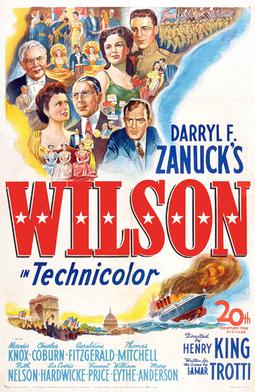
Wilson is a 1944 biographical film about Woodrow Wilson, the 28th president of the United States. Shot in Technicolor and directed by Henry King, the film stars Alexander Knox, Charles Coburn, Geraldine Fitzgerald, Thomas Mitchell, Ruth Nelson, Sir Cedric Hardwicke, Vincent Price, William Eythe and Mary Anderson.

Richard III is a 1955 British Technicolor film adaptation of William Shakespeare's historical play of the same name, also incorporating elements from his Henry VI, Part 3. It was directed and produced by Laurence Olivier, who also played the lead role. Featuring many noted Shakespearean actors, including a quartet of knights, the film depicts Richard plotting and conspiring to grasp the throne from his brother King Edward IV, played by Sir Cedric Hardwicke. In the process, many are killed and betrayed, with Richard's evil leading to his own downfall. The prologue of the film states that history without its legends would be "a dry matter indeed", implicitly admitting to the artistic licence that Shakespeare applied to the events of the time.
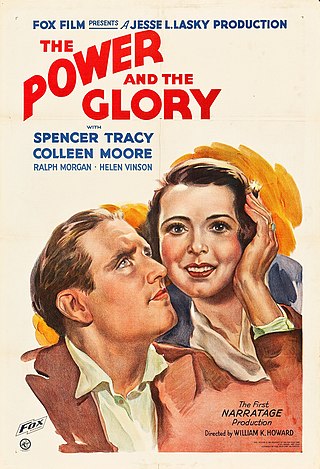
The Power and the Glory is a 1933 pre-Code film starring Spencer Tracy and Colleen Moore, written by Preston Sturges, and directed by William K. Howard. The picture's screenplay was Sturges' first script, which he delivered complete in the form of a finished shooting script, for which he received $17,500 and a percentage of the profits. Profit-sharing arrangements, now a common practice in Hollywood, were then unusual and gained Sturges much attention.

The Murder Man is a 1935 American crime-drama film starring Spencer Tracy, Virginia Bruce, and Lionel Atwill, and directed by Tim Whelan. The picture was Tracy's first film in what would be a twenty-year career with MGM. Tracy plays an investigative reporter who specializes in murder cases. The film is notable as the feature film debut of James Stewart. Stewart has sixth billing as a reporter named Shorty.
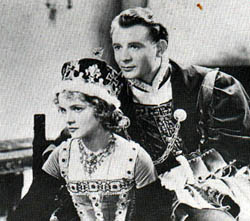
Tudor Rose is a 1936 British film directed by Robert Stevenson and starring Cedric Hardwicke and Nova Pilbeam.

Ferdinando Stanley, 5th Earl of Derby, was an English nobleman and politician. He was the son of Henry Stanley, 4th Earl of Derby, and Lady Margaret Clifford. Ferdinando had a place in the line of succession to Elizabeth I according to the will of Henry VIII, after his mother, whom he predeceased. His sudden death led to suspicions of poisoning amid fears of Catholic plots to overthrow Elizabeth.
The comedy of remarriage is a subgenre of American comedy films of the 1930s and 1940s. At the time, the Production Code, also known as the Hays Code, banned any explicit references to or attempts to justify adultery and illicit sex. The comedy of remarriage with the same spouse enabled filmmakers to evade this provision of the Code. The protagonists divorced, flirted with strangers without risking the wrath of censorship, and then got back together.

John Julian Timothy Jeal, known as Tim Jeal, is a British biographer of notable Victorians and is also a novelist. His publications include a memoir and biographies of David Livingstone (1973), Lord Baden-Powell (1989), and Sir Henry Morton Stanley (2007).

King Solomon's Mines is a 1937 British adventure film directed by Robert Stevenson and starring Paul Robeson, Cedric Hardwicke, Anna Lee, John Loder and Roland Young. A film adaptation of the 1885 novel of the same name by Henry Rider Haggard, the film was produced by the Gaumont British Picture Corporation at Lime Grove Studios in Shepherd's Bush. Sets were designed by art director Alfred Junge. Of all the novel's adaptations, this film is considered to be the most faithful to the book.

The Vagabond King is a 1956 American musical film directed by Michael Curtiz and starring Kathryn Grayson, Rita Moreno, Sir Cedric Hardwicke, Walter Hampden, Leslie Nielsen, and Maltese singer Oreste Kirkop in his only feature film role. It was produced and distributed by Paramount Pictures. It is an adaptation of the 1925 operetta The Vagabond King by Rudolf Friml. Hampden plays King Louis XI. Mary Grant designed the film's costumes.
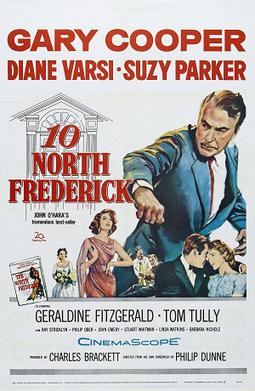
Ten North Frederick is a 1958 American drama film in CinemaScope written and directed by Philip Dunne and starring Gary Cooper. The screenplay is based on the 1955 novel of the same name by John O'Hara.
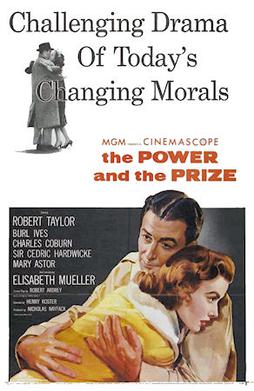
The Power and the Prize is a 1956 American drama film directed by Henry Koster and starring Robert Taylor, Elisabeth Muller, Burl Ives, Mary Astor and Cedric Hardwicke. It was produced by Metro-Goldwyn-Mayer. The screenplay was written by Robert Ardrey, adapted from the 1954 novel The Power and the Prize by Howard Swiggett. It was nominated for an Academy Award in 1957 for costume design.

Africa Squeaks is a 1940 Warner Bros. Looney Tunes cartoon directed by Bob Clampett. The short was released on January 27, 1940, and stars Porky Pig.
Malibu Beach Party is a 1940 Warner Bros. Merrie Melodies cartoon directed by Friz Freleng. The short was released on September 14, 1940.


















